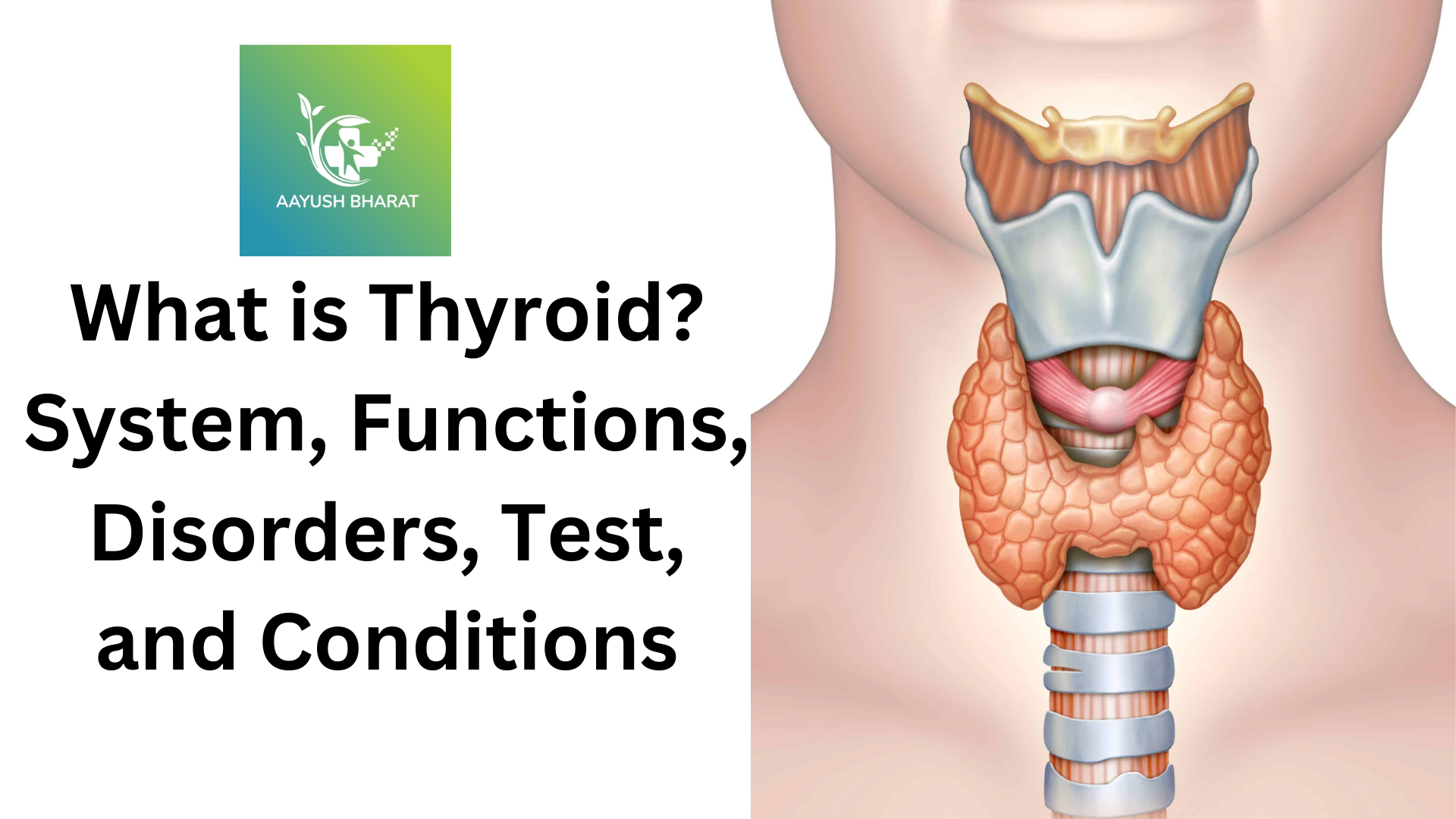If you want to Ask about anything related to Thyroid problems Contact Us or Comment.
To consult with a specialist Download the AayushBharat App from Playstore
The thyroid is a small, butterfly-shaped gland located at the base of the neck, just below the Adam’s apple. It is part of the endocrine system, which is a network of glands that produce and release hormones that regulate various bodily functions. The thyroid gland is responsible for producing two main hormones: thyroxine (T4) and triiodothyronine (T3). These hormones are essential for normal metabolism, growth, and development.

What is the endocrine system?
The endocrine system is a network of glands and organs that produce and release hormones into the bloodstream. Hormones are chemical messengers that travel throughout the body and regulate a wide range of functions, including growth and development, metabolism, reproduction, and mood.
Buy This Product:- RePro Shudh Shilajit
Major glands of the endocrine system include:
- Pituitary gland: Located at the base of the brain, the pituitary gland is often called the “master gland” because it controls the function of many other endocrine glands.
- Thyroid gland: Located in the neck, the thyroid gland produces hormones that regulate metabolism, heart rate, and body temperature.
- Parathyroid glands: Located behind the thyroid gland, the parathyroid glands produce hormones that regulate calcium levels in the blood.
- Adrenal glands: Located above the kidneys, the adrenal glands produce hormones that help the body respond to stress.
- Pancreas: Located behind the stomach, the pancreas produces hormones that regulate blood sugar levels.
- Ovaries (females): Located in the pelvis, the ovaries produce hormones that regulate menstruation, ovulation, and pregnancy.
- Testes (males): Located in the scrotum, the testes produce hormones that regulate male sexual development and function.
What are the Functions of the thyroid?
- Metabolism: Thyroid hormones play a crucial role in regulating the body’s metabolism, the process of converting food into energy. They influence how quickly the body breaks down food and uses it for energy, affecting overall energy levels, weight management, and heat production.
- Growth and Development: Thyroid hormones are essential for normal growth and development, particularly in children. They stimulate bone growth, brain development, and the maturation of various organs and tissues. Adequate thyroid hormone levels are crucial for optimal physical and cognitive development.
- Heart Rate and Blood Pressure: Thyroid hormones influence heart rate and blood pressure regulation. They affect how forcefully the heart contracts and how blood vessels constrict or dilate, contributing to maintaining normal cardiovascular function.
- Body Temperature: Thyroid hormones play a role in regulating body temperature. They influence heat production and heat loss mechanisms, helping the body maintain a stable internal temperature even in fluctuating external environments.
Buy This Product:- RePro In Combo
- Appetite and Digestion: Thyroid hormones affect appetite and digestion processes. They influence the body’s energy needs and how efficiently it utilizes food, impacting overall appetite control and nutrient absorption.
- Bone Growth and Strength: Thyroid hormones contribute to bone growth and strength. They influence the activity of bone-forming cells (osteoblasts) and bone-destroying cells (osteoclasts), helping maintain healthy bone density and structure.
- Skin and Hair Health: Thyroid hormones play a role in maintaining healthy skin and hair. They influence the growth and turnover of skin cells, hair follicles, and sweat glands, contributing to normal skin texture, hair growth, and perspiration.
- Nervous System Function: Thyroid hormones affect the functioning of the nervous system. They influence nerve impulse transmission, muscle coordination, and cognitive processes, contributing to overall neurological health.
- Reproductive Function: Thyroid hormones influence reproductive function in both men and women. They affect the production of sex hormones and the regulation of menstrual cycles, contributing to normal fertility and reproductive health.
Read More,
टांगों में दर्द की आयुर्वेदिक दवा एवं उपचार
दर्द का आयुर्वेदिक पद्धति द्वारा उपचार
आयुर्वेद द्वारा स्लिप डिस्क का उपचार
धातुरोग (SPERMATORRHEA) के लक्षण एवं आयुर्वेदिक उपचार
पेल्विक पैन– आयुर्वेदिक दवा एवं उपचार
In summary, the thyroid gland plays a critical role in maintaining overall health and well-being. Its hormones regulate a wide range of bodily functions, from metabolism and growth to heart rate, body temperature, and reproductive health. Proper thyroid function is essential for optimal physical and cognitive development, as well as maintaining a healthy balance in various bodily systems.
Buy This Product:- RePro Shudh Shilajit
If you want to Ask about anything related to Thyroid problems Contact Us or Comment.
Where is the thyroid located?
Your thyroid gland is located in the front of your neck, straddling your windpipe (trachea). It’s shaped like a butterfly — smaller in the middle with two wide wings that extend around the side of your throat. A healthy thyroid gland is not usually visible from the outside (there’s no appearance of a lump on your neck), and you can’t feel it when you press your finger to the front of your neck.
What are the parts of the thyroid?
There are two main parts of your thyroid: the two halves (lobes) and the middle of the thyroid that connects the two lobes (thyroid isthmus). Your thyroid is made of thyroid follicle cells (thyrocytes), which create and store thyroid hormone (mainly T3 and T4), and C-cells, which secrete the hormone calcitonin.
What conditions and disorders affect the thyroid?
There are several different types of thyroid disease. Thyroid disease is very common, with an estimated 20 million people in the United States having some type of thyroid disorder. Women and people assigned female at birth (AFAB) are about five to eight times more likely to be diagnosed with a thyroid condition than men and people assigned male at birth (AMAB).
Thyroid diseases are split into two types: primary and secondary.
In primary thyroid disease, the disease originates in your thyroid gland. In secondary thyroid disease, the disease originates in your pituitary gland. As an example, if you have a nodule on your thyroid that’s releasing excess amounts of thyroid hormones, it would be called primary hyperthyroidism. If a tumor in your pituitary gland is releasing excess amounts of thyroid-stimulating hormone (TSH), which then stimulates your thyroid to produce excess thyroid hormones, it would be called secondary hyperthyroidism.
Buy This Product:- Ultra Josh Capsules
The four main conditions that affect your thyroid include:
Hypothyroidism (underactive thyroid).
Hyperthyroidism (overactive thyroid).
Goiter (enlarged thyroid).
Thyroid cancer.
Common Tests to check the health of the thyroid:
The first-line test for checking the health of your thyroid is a blood test that measures your levels of thyroid-stimulating hormone (TSH). It’s a screening test for both hypothyroidism and hyperthyroidism.
In general, the normal range for a TSH blood test is 0.5 to 5.0 mIU/L (milli-international units per liter). However, this can vary from lab to lab and depending on certain factors, such as pregnancy and age.
Your provider can also check the levels of T4 and T3 (thyroid hormones) in your blood.
If your test results come back abnormal your provider may suggest having an imaging test such as a thyroid scan, which uses small amounts of a safe, radioactive material to create images of your thyroid, or a thyroid ultrasound.
If you want to Ask about anything related to Thyroid problems Contact Us or Comment.
How are thyroid conditions treated?
Treatment for thyroid conditions and disorders depends on the specific condition and its severity. However, some common treatment approaches include:
Thyroid hormone replacement therapy (THRT):
THRT is the standard treatment for hypothyroidism, which is a condition in which the thyroid gland doesn’t produce enough thyroid hormones. THRT involves taking synthetic thyroid hormones, such as levothyroxine (Levo-T, Synthroid, others), to replace the missing hormones. THRT is typically taken orally for life and can effectively manage hypothyroidism symptoms and restore normal thyroid hormone levels.
Antithyroid medications:
Antithyroid medications are used to treat hyperthyroidism, a condition in which the thyroid gland produces too much thyroid hormone. These medications work by blocking the production of thyroid hormones. Common antithyroid medications include methimazole (Tapazole) and propylthiouracil (PTU). Antithyroid medications may be used alone or in combination with other treatments, such as radioactive iodine therapy.
Radioactive iodine therapy:
Radioactive iodine therapy is a treatment that uses radioactive iodine to destroy thyroid tissue. It is often used to treat hyperthyroidism that does not respond to antithyroid medications or to treat thyroid cancer. Radioactive iodine therapy is typically administered as a single dose and is generally effective in reducing or eliminating thyroid hormone production.
Surgery:
Surgery may be an option for treating certain types of thyroid conditions, such as goiter or thyroid cancer. Goiter surgery involves removing part or all of the enlarged thyroid gland. Thyroid cancer surgery involves removing the entire thyroid gland or parts of the thyroid gland and adjacent lymph nodes. Surgery is typically performed by an experienced endocrine surgeon.
Lifestyle modifications:
In addition to medical treatments, lifestyle modifications may also play a role in managing thyroid conditions and disorders. These may include:
Maintaining a healthy weight
Eating a balanced diet rich in iodine and other nutrients
Quitting smoking
Managing stress
Getting regular exercise
Regular monitoring:
Regular monitoring is important for people with thyroid conditions and disorders, even if they are on treatment. This typically involves blood tests to check thyroid hormone levels and assess the effectiveness of treatment. Regular monitoring allows doctors to adjust medications as needed and ensure that thyroid hormone levels are maintained within a normal range.
When should I call my doctor about my thyroid?
If you’re experiencing symptoms of thyroid disease, such as changes in your weight, heart rate, and temperature sensitivity, contact your healthcare provider. They can run a simple blood test to see if your thyroid is the cause of your symptoms.
Follow Us On:- Facebook, Twitter, Instagram, Youtube
If you want to Ask about anything related to Thyroid problems Contact Us or Comment.


0 Comments